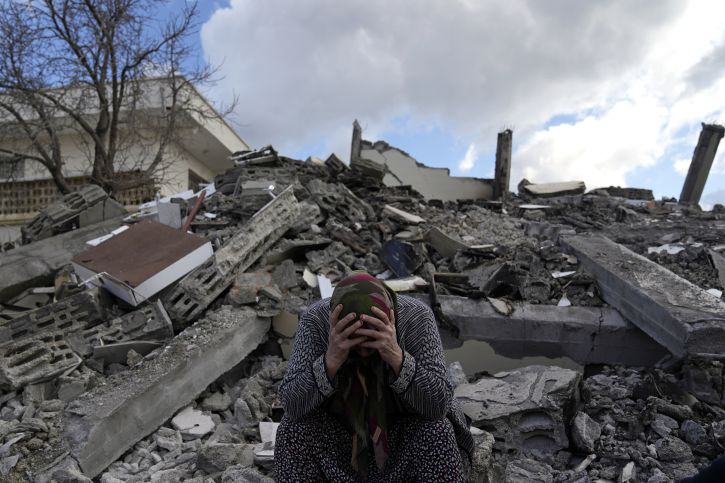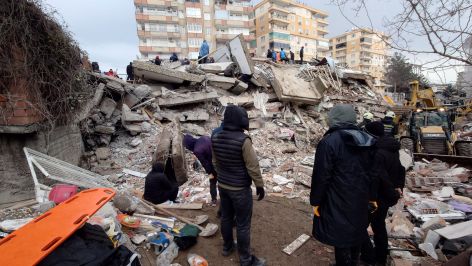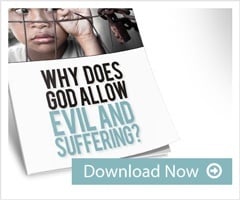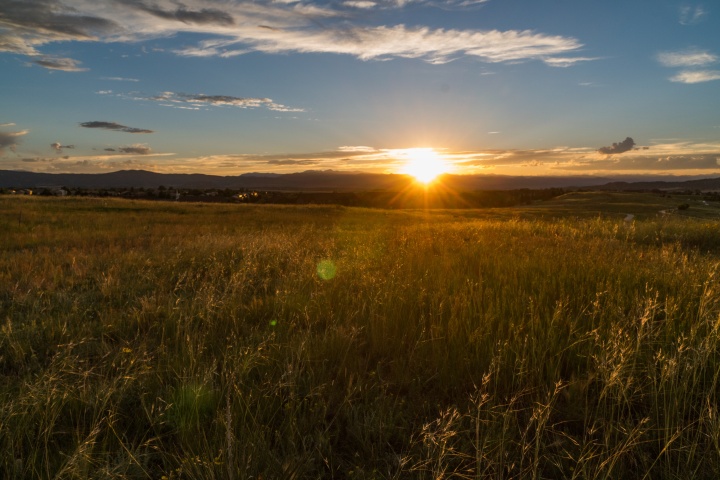.
Powerful Earthquakes Hit Turkey and Syria: Making Sense of the Tragedy
 A distraught woman sits on rubble of a building in southern Turkey that was destroyed by the earthquakes of Feb. 6, 2023 (AP Photo/Khalil Hamra).
A distraught woman sits on rubble of a building in southern Turkey that was destroyed by the earthquakes of Feb. 6, 2023 (AP Photo/Khalil Hamra).
“Thousands have died in the recent earthquakes in Turkey and Syria. Life in this region will be impacted for years to come. Why do such tragedies occur?
Thousands of lives were suddenly wiped out when a magnitude 7.8 earthquake and then a magnitude 7.5 earthquake struck southern Turkey and northern Syria on Feb. 6, 2023. As of this writing, the death toll is over 6,000.
With the more than 300 aftershocks and frigid temperatures, this number will undoubtedly rise as more bodies are recovered from the rubble. In an instant, a shaking earth destroyed buildings and roads and buried thousands of unsuspecting people. Over 13,000 people were injured, and tens of thousands were without food, shelter and hope.
Both Turkey and Syria were grossly unprepared for this tragedy. Their buildings were not designed to withstand an earthquake of this magnitude. On top of that, they lack the resources to handle the aftermath of these deadly earthquakes.
Syria is still embroiled in a seemingly unending civil war. The city of Aleppo, home of many displaced refugees, was first ravaged by missiles and is now even more decimated by this natural disaster.
Our thoughts and prayers go out to the families affected by this tragedy. Tragedies like this should remind us how precious life is and how quickly life can be turned upside down. It’s at times like these that we should turn to the Bible. The Bible gives a unique perspective on tragedies, including difficult lessons we should learn.
To learn more about the biblical perspective on tragedies, read “Why Does God Allow Evil and Suffering?”
Lessons from the tragedy in Turkey and Syria
Consider these three lessons:
1. This is not God’s world.
Many see tragedies like this as proof that there is no God. They reason that an all-powerful, all-loving God would not allow tragedies like this. But the Bible shows a different way we should look at it. Tragedies don’t occur because God doesn’t care. Ultimately, they are a result of humanity’s rejection of God. Essentially, this is not God’s world!
The suffering and anguish in Turkey and Syria and everywhere else are a result of living in a world cut off from God.
When God created Adam and Eve, He placed them in a beautiful garden and interacted directly with them (Genesis 2:8; Genesis 3:8). There were no earthquakes or other natural disasters in this garden. God was there and provided perfect protection and order. All God required of our first parents was that they live by His instructions. If they did, they would live in complete safety and happiness. They would not need to worry about natural disasters.
But when Satan appeared in the form of a serpent, he convinced them to reject God’s instructions and authority over their lives (Genesis 3:1-5). Because of this rejection, dire consequences would follow for them and their descendants. God removed them from the Garden of Eden and let them live in a world without His protection and influence (Genesis 3:23).
All human beings have been given the same free will to choose their own way of living. God warned that rejecting His law would bring suffering and death (Genesis 2:17; Deuteronomy 30:15-20). Satan’s influence currently prevails over this world because man follows his own way over God’s way (2 Corinthians 4:4). The suffering and anguish in Turkey and Syria and everywhere else are a result of living in a world cut off from God.
2. Unless we change, we will all perish.
Jesus Christ commented on two tragedies that occurred in His time on earth. One was the execution of several people by Pontius Pilate (Luke 13:1). Another was the accidental death of 18 people crushed to death by a falling tower (verse 4).

Turkish citizens searching for survivors in the ruins of a collapsed building in Diyarbakir, Turkey, Feb. 6, 2023 (Voice of America).
Christ used these tragedies to stress an important point. He said that those who died were in the wrong place at the wrong time. God hadn’t singled them out for punishment. The point He drew from these incidents was this: “Unless you repent you will all likewise perish” (verses 3 and 5).
Those who died in the recent disaster did not bring these earthquakes on themselves. The people living in this region weren’t necessarily more guilty of sin than any other people. They were simply in the wrong place at the wrong time.
The point we must take to heart is that we will die eternally if we do not repent of our sins. That is the death we should be most worried about! Those who die in tragedies may have lost their temporary physical lives (which God says He will restore in a resurrection), but if we don’t repent and change, we will perish forever (Romans 6:23).
3. Earthquakes are prophesied to increase and intensify during the last days.
Why are earthquakes (and other natural disasters) continually increasing around the world?
In the Olivet Prophecy, Jesus Christ prophesied that in the last days there would be “earthquakes in various places” (Matthew 24:7). As that time approaches, earthquakes will increase both in intensity and in frequency. Read more in our article “Earthquakes in Bible Prophecy.”
Since the start of the 21st century, not including this recent disaster, there have been 22 major earthquakes (greater than a magnitude 6) causing some 834,000 deaths! Some of the deadliest earthquakes since 1900 have occurred in recent years. These include:
The growing number of earthquakes is a sign that the return of Jesus Christ is drawing near.
Haiti (Jan. 12, 2010). Magnitude 7; 316,000 people killed. This was the deadliest earthquake of this century.- Indonesia (Dec. 26, 2004). Magnitude 9.1; 228,000 people killed in the earthquake and subsequent tsunami. This was the third- largest earthquake since 1900.
- China (May 12, 2008). Magnitude 7.9; 90,000 people killed or missing and presumed dead.
- Pakistan (Oct. 8, 2005). Magnitude 7.6; over 86,000 people killed.
- Iran (Dec. 26, 2003). Magnitude 6.6; 41,000 people killed.
(Since casualty reports in these disasters often vary, the above casualty numbers should be considered approximate.)
As the weeks turn into months, the death toll from the recent earthquakes in Turkey and Syria will undoubtedly rise and possibly cause them to rank among the worst earthquakes in recent times.
The growing number of earthquakes is a sign that the return of Jesus Christ is drawing near. This should motivate us, more than ever, to heed Christ’s warning from point two: repent!
What will you do now?
 The Bible and history prove this simple statement: A world without God leads to suffering, tragedy and death.
The Bible and history prove this simple statement: A world without God leads to suffering, tragedy and death.
As you see the resulting suffering of this tragedy, ask yourself this question: Do I want to continue to be a part of the suffering that comes from a life cut off from God? Or do I want to have a relationship with Him and live a life that is blessed and happy (Psalm 1) and help prepare for the peaceful world Jesus Christ will bring at His return?” From: https://lifehopeandtruth.com/prophecy/blog/powerful-earthquakes-hit-turkey-and-syria-making-sense-of-the-tragedy/
To learn more about the future time when natural disasters will end, download our free booklet The World to Come: What It Will Be Like.
__________
How Does God Want to be Worshipped?
 Jack Le Roux/Unsplash
Jack Le Roux/Unsplash
“Christ commanded us to worship God in spirit and truth (John 4:24). But how do we worship God? Can we know what pleases Him?
Christ kept the Sabbath Holy all His life, and He was an example for us.Yes, in God’s Word we can learn how He wants to be worshipped. Christ Himself said, “If you love Me, keep My commandments” (John 14:15). Those timeless commandments God gave to mankind are key to happiness, peace, abundance and harmony. Just read through any of them and imagine how life would be if all mankind strictly observed just one of those ten!
But, how do we worship God? The first four of the Ten Commandments all have to do with how we respect and honor God. He tells us how to live if we truly love Him and want to “hallow His name.” Those first four are:
1. Have no other gods besides Me.
2. Make unto yourself no graven image of anything in heaven or earth or the water under the earth; you shall not bow down to them nor serve them.
3. You shall not take the name of the Lord your God in vain; and
4. Remember the Sabbath day to keep it holy.
If you believe in Christ, you probably agree with the first three of the Commandments, but do you keep the fourth?
The Sabbath day
On the seventh day of creation God created the Sabbath day for mankind (Genesis 2:2-3). Jesus Christ said the “Sabbath was made for man and not man for the Sabbath” (Mark 2:27) and that He was “Lord of the Sabbath” (Matthew 12:8). Christ kept the Sabbath holy all His life, and He was an example for us. His apostles kept the Sabbath day all their lives—even after Christ died, was resurrected and then ascended into heaven—as did the New Testament Church of God.
God designed the Sabbath to be “Holy time”— a 24-hour period we should remember and set aside to do God’s will. In Leviticus 23, God says that each Sabbath is a “Holy convocation”—a time for His people to assemble before Him (Leviticus 23:1-34).
If we say we worship God and want to please Him, we must do as He says. If we do, He says He will make His home with us. If we don’t, Christ says, “Depart from Me, you who practice lawlessness” (Matthew 7:23).
Do you worship God the way He wants to be worshipped? Living God’s way is a “24-7” life. The Sabbath day is Holy and we must honor Him on that day.
Do you want to worship God as He wants to be worshipped each Sabbath? Then please join us for Sabbath services, even if it is virtually at first, at one of our many locations around the world. If you’d like to talk to someone or want more information, contact us and we will get right back with you. We encourage you to read our vital booklet on this subject, “Sunset to Sunset: God’s Sabbath Rest.” From: https://www.ucg.org/bible-study-tools/bible-questions-and-answers/how-does-god-want-to-be-worshipped
________
Is Cheese Really Good for Our Health?

“What is the real story behind the recent studies that show cheese has neutral or positive health effects?
In my series of videos on saturated fat, I talked about a major campaign launched by the global dairy industry to “neutralize the negative image of milk-fat among regulators and health professionals as related to heart disease.” As you can see in my video “Is Cheese Really Bad for You?”, (Is Cheese Really Bad for You? | NutritionFacts.org) that campaign continues to this day with the publication of a meta-analysis demonstrating “neutral [non-harmful] associations between dairy products and cardiovascular and all-cause mortality,” that is, death.
How do we know the dairy industry had anything to do with this study? Well, it was published in a journal that requires authors to disclose financial conflicts of interest. So, what ties were divulged? As you can see at 0:47 in my video: Dairy, dairy, dairy, dairy, dairy, dairy, the fourth largest dairy company in the world, dairy, dairy, milk, beer, soda, McDonald’s, dairy, dairy, dairy, dairy, and more dairy. Oh, and the study itself was “partly funded by…the Global Dairy Platform, Dairy Research Institute and Dairy Australia.” So, there we have it. More at: https://nutritionfacts.org/2023/01/26/is-cheese-really-good-for-our-health/?
Key Takeaways
- The dairy industry’s campaign to “neutralize the negative image of milk fat among regulators and health professionals as related to heart disease” continues, and the industry still funds studies like the meta-analysis that purportedly showed that dairy products have non-harmful associations with “cardiovascular and all-cause mortality.”
- Researchers affiliated with the largest dairy producer in China, thereby one of the largest dairy companies in the world, suggested eating cheese each day isn’t only neutral (non-harmful), but beneficial for our health.
- Many studies were from Europe where greater cheese consumption is associated with a “higher socioeconomic status” since it is generally more expensive. Higher socioeconomic groups also consume more fruits and vegetables, and have higher education levels and higher paying jobs, all of which are associated with better health outcomes.
- Higher socioeconomic groups also tend to consume more candies. The candy industry and the U.S. Department of Agriculture have claimed that candy consumers have lower inflammation levels and a 14 percent lower risk of elevated blood pressure.
- U.S. taxpayer dollars prop up the sugar industry with a billion dollars annually. Similarly, the U.S. government uses tax dollars to buy tens of millions of dollars’ worth of surplus cheese.
- The U.S. government has been found to collude with the dairy industry to promote their products. “These [checkoff] funds are used to promote junk foods, which contribute to the very diseases our federal government is allegedly trying to prevent. Does it make sense to tell Americans to avoid foods high in salt, sugar, and saturated fat, while engaging in the promotion of those same foods?” From: https://nutritionfacts.org/2023/01/26/is-cheese-really-good-for-our-health/?
_______













No comments:
Post a Comment